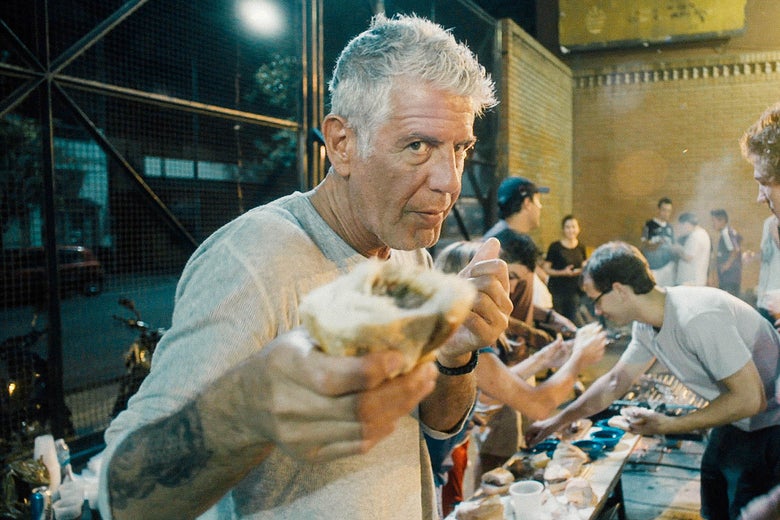It’s weird to talk about “the mystery” of Anthony Bourdain. The truth is, the chef-turned-author-turned-travel show star was one of the most visible and open people on the planet. At one point in Roadrunner: A Film About Anthony Bourdain, director Morgan Neville uses clips from a 2016 episode of the CNN travelogue show Parts Unknown in which Bourdain talks to a therapist while visiting Argentina. “I should be happy,” he says. “I have incredible luck.”
Do you ever feel happy, the therapist asks? “No,” replies Bourdain.
It’s true, Bourdain did have good luck. His 2000 book Kitchen Confidential defined the seedy glamour of restaurant work for a generation—more importantly, it was an inspiration to millions of talented, smart people stuck in dead end jobs. He successfully parlayed his second book, A Cook’s Tour, into a third career as a travel writer and TV host. When he died of suicide in 2018 while on a shoot in France, his friends and fans were devastated. How could a former cocaine and heroin addict who had survived 25 years in an industrial kitchen to become the voice and conscience of Americans abroad decide to check out so suddenly?
When someone kills themselves, those of us left behind want answers. As his friend, graffiti artist David Choe says late in the film, “Tony let me down.”
But the truth about suicide is much more mundane. Cases like Cleopatra, who killed herself because she lost the Battle of Alexandria and was about to be deposed from her throne by the Romans, are exceedingly rare. The answer to “Why did they do it?” almost never has a clear cut answer beyond lifelong mental illness. One day, things just caught up with them.
Neville, to his credit, understands that the big risk in making this film is to focus too much on the end. This is a biography, like Won’t You Be My Neighbor?, his 2018 film on Fred Rogers. It benefits greatly from the hundreds of hours of video shot by the crews following him on his trips around the world, thanks to longtime producer and creative partner Lydia Tenaglia. Bourdain’s career arc is measured visually by the progression from blurry millennial digital video to sharp 4K. His own words, of which there are volumes, explain his growth from a rather insular New Yorker to a world traveler. “I don’t trust anything that happens out there,” he says early in the picture, gesturing to the world outside the kitchen.
But an incident in 2006, when he and his crew were trapped in a Beirut hotel while a war between Israel and Hezbollah destroyed the vibrant city around him, fundamentally changed his perspective. Later, when a Laotian man who lost limbs in an American bombing attack during the Vietnam War asks him why he used what was ostensibly a cooking show to highlight the abuses of American imperialism, he replies, “It’s the least I can do.”
That’s the Bourdain that his audience trusted and loved: Empathetic, honest, and open about the lucky breaks he received. Yes, he was a talented writer with a magnetic persona, but he was also in the right place at the right time, and he never forgot it. Neville and editor Eileen Meyer balance potential hero worship by interviewing people who worked with him, and knew how difficult he could be to get along with in real life. Thanks to Neville’s decision not to interview actress Asia Argento, the girlfriend whose public breakup happened days before his suicide, Bourdain superfans might not find much new to learn in Roadrunner. But it was the right choice. This movie is not about “who killed Anthony Bourdain?” It is “who was Anthony Bourdain?” As the title, taken from a Jonathan Richman song, implies, he was a guy who ran all his life, until he couldn’t any more.
